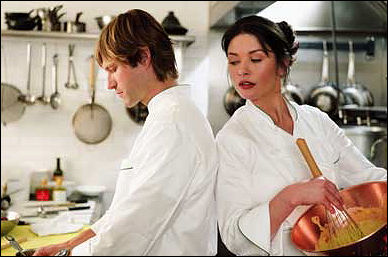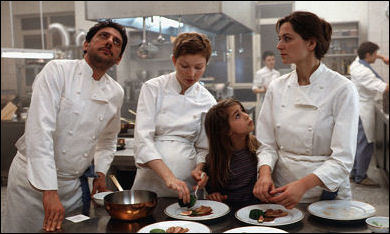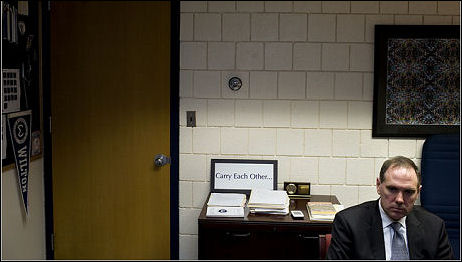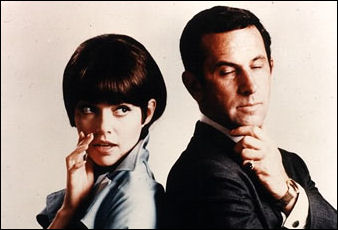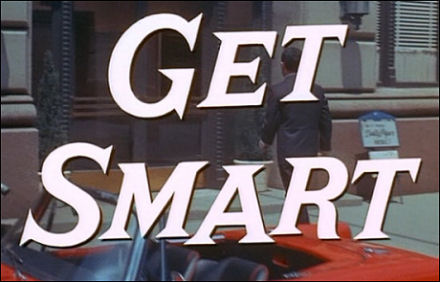Lonely Hearts (Samuel Goldwyn, 4.13) wasn’t nearly as hard to sit through as I’d been told to expect. In a groggy, heavy- lidded way I could even describe this period police drama as reasonably decent. And if you’re into red-lipped hotties it’s worth checking out for Salma Hayek‘s performance as infamous serial killer Martha Beck, a bad-ass mama who’s emotionally obsessive (to put it mildly) and almost sadly malicious.
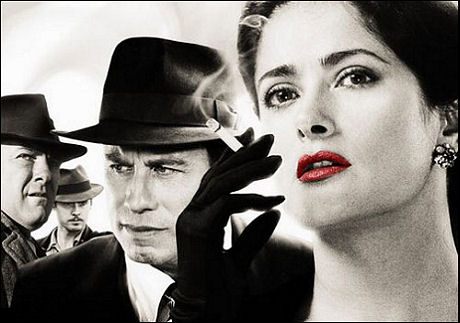
What’s great about Hayek is that her twisted behavior feels earnest and believable. She’s way too pretty and curvy to play Beck as she actually was (i.e., homely and obese, somewhere between 250 and 300 pounds), but I didn’t care. I didn’t feel Hayek was acting as much as being. She’s quite depraved and quite good.
Except for her very last bit, that is, when she’s about to be fried in the electric chair. She calmly looks at a cop watching her and says with an almost impudent look on her face, “So long.” The real Beck silently mouthed the words, which would have been a better choice. I know I didn’t buy Hayek’s coolness and resolve. I’m guessing that everyone feels terrified when they’re about to be put do death. A guy watching Saddam Hussein on the gallows in Iraq said he looked scared. That felt right when I read that.
So the movie is not an embarassment, and yet I can’t call Lonely Hearts anything to write home about. The story isn’t especially moving or startling or thematically rich, and it hasn’t been shot in what anyone would describe as stylistically stand-out. The pacing is just this side of slow, the color is drab and bleachy, and nothing pops through as exceptional. It’s a been-there, done-thatter.
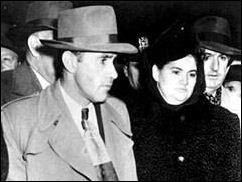
A period drama about a couple of overweight Nassau County detectives (John Travolta, James Gandolfini) on the trail of a couple of real-life nutbag psychos, Lonely Hearts is the third or fourth movie version of the true “Honeymoon Killers” saga. (The best was Leonard Kastle‘s The Honeymoon Killers.)
We’re seeing it again now because Todd Robinson, the director-writer, is the grandson of Travolta’s character, Det. Elmer C. Robinson. And he wants us to know that his grandfather had all kinds of rage boiling inside, that he was haunted by his wife’s suicide, that he took his job a little too personally. And he managed to persuade everyone who helped him make Lonely Hearts that this would add something significant. It doesn’t.
Robinson obsesses about catching Beck and Ray Fernandez (Jared Leto), a pair of cold-blooded killers. But they’re primarily scam artists, and sloppy ones at that. Their haphazard game is about Ray, a hyper, balding guy with a jerkwad moustache, seducing older women, gaining their confidence, and getting them to part with their cash. The wackjob element comes from the lovesick Beck being unable to watch (or listen to) Fernandez making love with these women, which leads her to kill some of them out of concern that Fernandez is actually falling for them.

The story is about Travolta and Gandolfini, who look like they’d outweigh a Holstein cow if you put them both on the same scale, trying like hell to hunt down Hayek and Leto and not succeeding for 90% or 95% of the film. I obviously knew that satisfaction was an hour or two around the corner, but I wasn’t into following the hints and maybes and the accumulation of leads like I was with David Fincher‘s Se7en, say.
What I cared about is how sick and depraved Hayek was playing it. Not that I enjoy watching diseased behavior, but this was where the juice was. The cops were too flat, too bored with themselves, too accustomed to the grind. Scott Caan, another Nassau County detective, played a variation of the same cocky smart-ass he always plays. Strictly tinsel on the tree.
You know something’s wrong when you’re watching a movie about real-life killers and all you can think about is going home so you can look them up online and read the real stories and look at the old photos.
One last Hayek thought, (i.e., one that her Beck performance caused me to ponder). Why is it that the craziest and most psychotic women are always the best in bed, and the steadiest, most loyal and most sensible women (i.e., the best partner types) are always a little bit rote in that department? God has a perverse sense of humor — that’s all I can say.


